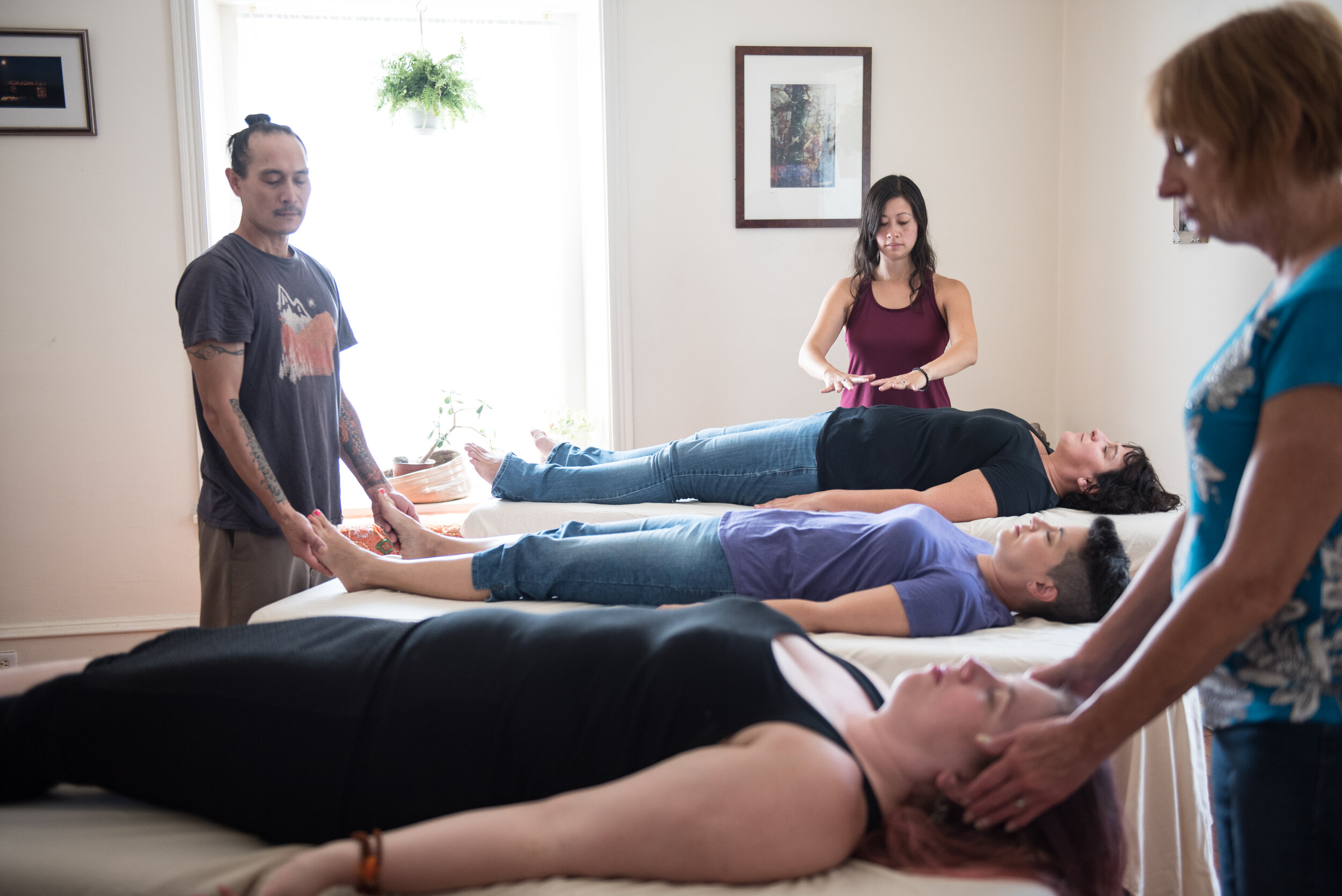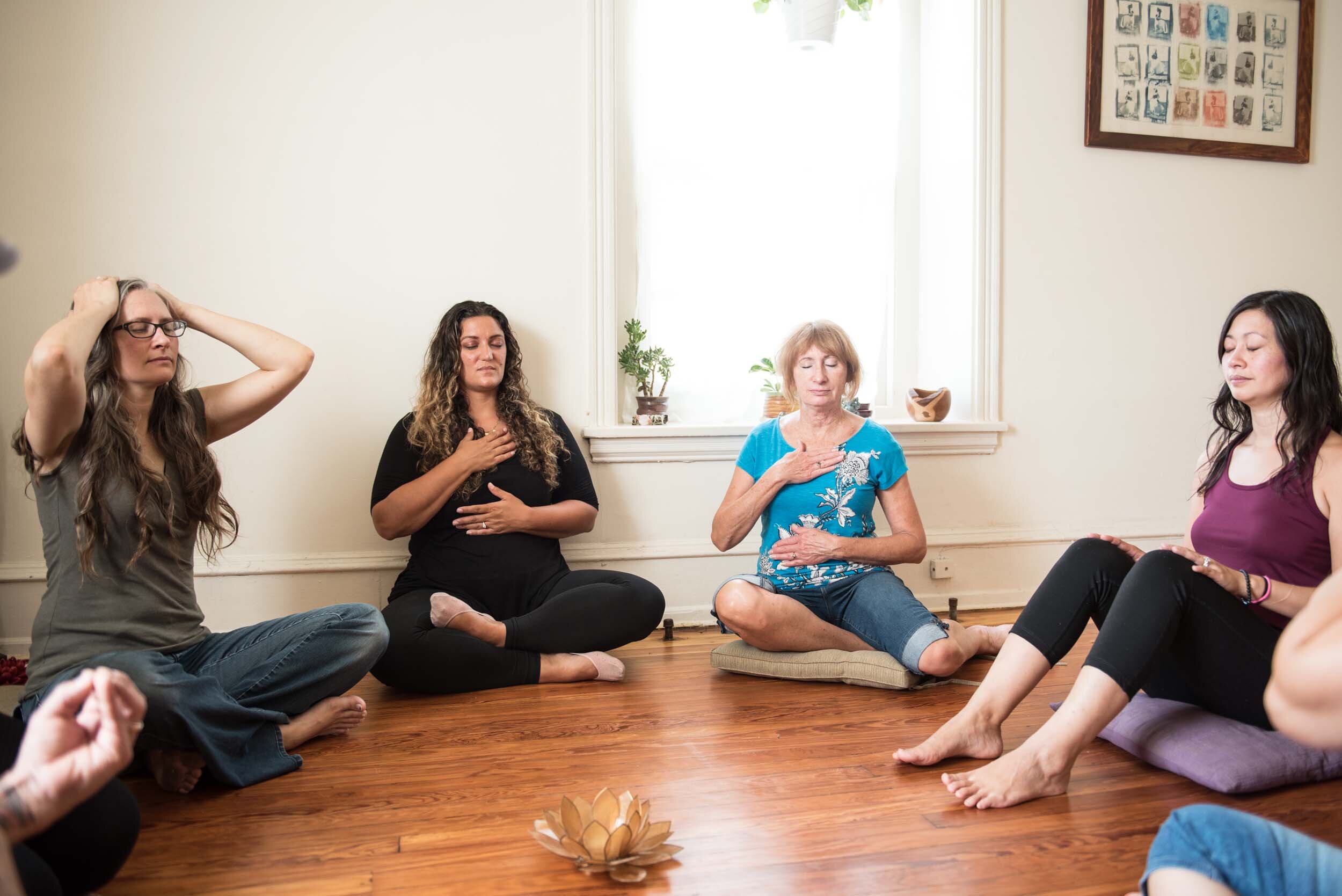
The Earl E. Bakken Center for Spirituality and Treatment says that Reiki is a type of energy treatment that began in Japan in the early 1900s. The International Center for Reiki Training says it comes from the idea that everyone has a "life force energy" that runs through their bodies.
Reiki energy healingpractitioners move their hands gently over or on top of a client's covered body. They do this to help the client feel less stressed and heal faster by promoting a healthy flow of energy.
A study by the National Institutes of Health (NIH) in 2008 found that in the US, 1.2 million people and 161,000 children had energy healing therapies like Reiki in the previous year. A past trial study found that more and more Americans are using Reiki because they think it helps with pain control, sadness, and stress.
What Is Reiki?
The National Center for Complementary and Integrative Health (NCCIH) says that Reiki treatment is a way to send energy through the body to help the person heal. A previous review said that the Reiki practitioner and the energy that heals them don't cause the healing or come from them; they're just a conduit for the energy, like how a yard hose is a conduit for water.
The International Center for Reiki Training says that the word "Reiki" comes from the mixture of two Japanese words: "rei," which means "God's light" or "the higher power," and "ki," which means "life force energy."
A qualified Reiki master teacher who works in Waikoloa, Hawaii, and Charlottesville, Virginia, says that Ki is the life force energy that moves all living things. "Rei" and "ki" together mean "spiritually guided life force energy," according to the International Center for Reiki Training.
In Japan, Reiki is taught by a sensei, who then shares their knowledge with the student through attunement. This initiation ceremony helps open the student's energy channels so that healing energy can flow more quickly and possibly improve health, according to past research.
The International Center for Reiki Training says that once these pathways are opened, the practitioner can use them for the rest of their life.
Understanding The Essence Of Reiki Energy Healing
Reiki is a way to heal by sending energy from the healer to the person who needs it. The word "rei" means "universal," and "ki" means "life energy." The main idea behind Reiki is that all living things are connected to a standard life force energy.
Some practitioners think that when this energy is disturbed or out of balance, it can cause physical or mental problems. Reiki tries to bring balance, healing, and rest by using and controlling this energy.
Origins And Evolution Of Reiki
Reiki has its roots in old Japanese practices. Dr. Mikao Usui found it in the early 1900s. Usui went on a spiritual quest to learn more about how old healing methods worked. This led him to create the system of Reiki.
Reiki changed and grew over time, taking parts from many different spiritual and cultural systems. At this point, it represents a mix of old knowledge and current alternative medicine.
The Five Principles Of Reiki
What are the Five Reiki Principles or Five Reiki Precepts? These are the five main ideas that makeup Reiki theory. These ideals tell practitioners how to live their lives and stress how important it is to be thoughtful, kind, and thankful every day. They are: I'm not going to be mad today.
- I'm not going to worry today.
- I will be thankful today only.
- I'm going to be honest about my work today.
- I'm going to be nice to all living things today.
These principles give Reiki practitioners a moral and ethical basis for their work. They also encourage a complete approach to recovery that goes beyond the physical world.
What Happens In A Reiki Session?
Reiki treatments are usually done in a quiet, private place by a practitioner. The surgery can happen anywhere, though. The person will sit or lie down on a table while fully dressed during a lesson. The therapist will then lightly touch or go over certain parts of the client's head, body, and chest.
Most of the time, they'll hold their hands in these poses for three to ten minutes. If someone is hurt, like with a burn, the therapist will put their hands just above the wound. A practitioner is said to be transferring energy when they lightly place their hands on or over the body.
The practitioner may say that their hands feel warm or tingly at this point. They will stay in each hand pose until they feel the energy has stopped moving. When the therapist thinks the energy or heat in their hands is gone, they will take them off and put them on a different part of the body.
How Does Reiki, A Form Of Energy Healing, Work?
In other words, how does Reiki work? We need to find an honest answer. Scientists still need to learn how things work. Some people have ideas. A common idea is based on something called the "biofield."
The biofield is an electric field that all living things are in and around. A Reiki expert and professor of physiology at the University of Arizona's College of Medicine says that this field goes out at least 15 feet from the body.
For example, the heart controls heartbeats by making an electrical field that can be seen on an electrocardiogram or ECG. The brain makes an electric field, too, but not as strong as the heart's. According to the above review of the books, all of the cells in the body make positive and negative electrical charges, which then form magnetic fields.
This idea says that the effects of touch treatments like Reiki might be due to the contact between two people's magnetic fields. The biofield is thought to be the energy that controls how the body works, and Reiki energy affects the biofield. People believe that the biofield's rhythmic properties change over time, which affects how living things' bodies and minds work.
Who Can Practice Reiki?
As long as they learn with a "Reiki master," finish training, and have at least one procedure. There isn't a national test to pass, and each state needs to have its own rules about registration.
A Reiki master "opens" what they think are energy lines in a person's body during the practices that make them a Reiki practitioner. This is part of a process called tuning. A level of connection is different for everyone. People who believe in Reiki think that.
- When someone is tuned to the first degree, they can use touch to practice Reiki on themselves and others.
- The second degree lets someone practice it in their mind from afar, without touching anyone.
- People with the third degree, which is also known as the master level, can give connection practices to other people.
Ask your doctor if they know of any Reiki practitioners who are both experienced and honest. To find someone who knows someone who needs Reiki, you could also ask people close to you.
Spiritual Connections Of Reiki Energy Healing
Beyond its effects on the body and mind, Reiki energy therapy has deep roots in spiritual ideas and links. The practice, which comes from old Japanese customs, combines the ideas of mental unity and universal life force energy.
This piece goes into detail about the spiritual sides of Reiki. It talks about how it relates to faith, the importance of purpose, and the life-changing journey it can give to those who accept its spiritual sides.
The Spiritual Essence Of Reiki
There is a deep spiritual link at the heart of Reiki. A general life force energy, sometimes called "ki" or "chi," is thought to run through all living things. It is thought that this energy can heal and balance on a spiritual, mental, and physical level when it is guided and used by a practitioner.
Reiki is applicable to people of all spiritual views because its spiritual essence is not limited to one religion.
The Role Of Intention In Reiki Practice
Reiki energy healing incorporates a spiritual dimension founded on the power of intention. Practitioners emphasize intentions of a positive and healing nature. Intention is thought to guide the movement of energy and boost its curative powers.
This purposeful element of Reiki encourages both the practitioner and the recipient to be fully present in the moment of healing, fostering a sense of mindfulness and spiritual connection.
Chakras 0 Energy Centers And Spiritual Gateways
Understanding the spiritual dimensions of energy healing is essential to practicing Reiki. It is widely held that the seven major chakras serve as energy hubs, each responsible for a different aspect of one's mental, emotional, and spiritual health.
In order to achieve optimal health, Reiki practitioners frequently work on clearing and balancing these energy points. Chakra balancing is practiced as a means of developing one's spirituality and strengthening one's connection to the life force energy of the universe.
Reiki Energy Healing Aftereffects
Conventional wisdom holds that Reiki is risk-free. But it may cause some side effects like the following.
Discomfort During A Session
It is common practice for a person receiving reiki to lie face-up on a massage table in a dimly lit room. A seated position is perfectly acceptable for a Reiki treatment. Your practitioner will be standing over you, so you must remain still.
Soft music may be played in the background, but there will be no conversation. This may make some people feel uneasy or out of place. It may cause nervousness, panic attacks, and an inability to calm down.
Drop-In Blood Oxygen Levels.
A reputable source studied the effects of reiki on children's dental procedure pain. Twenty kids were given the real deal, while the other 18 were given a sham treatment by researchers who hadn't received any reiki training.
Increased Tiredness
From what I've heard, after a reiki session, most people feel much more at peace with themselves. In contrast, some people may experience an unusual lack of energy. According to the practitioners, this is a sign that your body is recovering. It has been suggested that other symptoms, such as sleepiness, may co-occur.
- headache
- stomachache
- weakness
What To Know Before Getting Reiki
It's essential to weigh the benefits of reiki against any potential drawbacks before committing to a session. You'll be better able to decide after reading this.
Negative aspects of reiki could include:
Limited Scientific Backing
There is not enough evidence to prove the efficacy of reiki despite its widespread use. The results of the majority of reiki studies have been contradictory.
The existence of the body's energy field has also yet to be demonstrated by science. Even if it does, there is no way for science to measure how this energy might be balanced or transmitted.
It’s Unregulated
The practice of Reiki is unregulated. Anyone body does not establish national guidelines for
- education
- training
- credentials
- certification
Even if you don't have a medical background, you can still practice reiki. Not all professionals must meet the same standards to earn a certification.
It May Not Be Covered By Insurance.
In some cases, health insurance may pay for Reiki if it is included in a more conventional treatment that is covered. Reiki, for instance, is sometimes integrated into medically-approved treatments like physical therapy.
However, a visit to a reiki master will require you to shell out cash. Depending on the practitioner's expertise, you could pay anywhere from $25 to $100 or more.
Experiences Vary
Reiki's purported advantages are often exaggerated. Furthermore, the sensation of receiving reiki is entirely individual. It's not easy to foresee your emotions.
The more receptive a person is to reiki's potential, the better the results, it is said. Therefore, your experience may be altered by your level of skepticism.
Does Not Treat Specific Conditions
Therapeutic Reiki is not meant to replace conventional medical care. No illnesses or conditions are alleviated by this method. Instead, it's meant to encourage health in all its forms. In addition to receiving reiki, conventional medical care should be sought out if you are suffering from a severe illness.
Scientific Perspectives On Reiki Energy Healing
The scientific community has responded with both interest and skepticism to Reiki energy healing despite its reputation as a holistic and alternative approach to health.
Although energy healing has gained popularity due to its purported benefits, it has been met with mixed reviews in the academic and medical communities due to a need for a clear scientific framework and the difficulty of measuring energy healing.
Exploring The Evidence
The goal of scientific research into Reiki energy healing is to learn more about its potential benefits and how it might work to improve people's health.
Stress reduction, pain management, and an enhanced quality of life are just some of the areas that have been the focus of numerous studies that evaluate the efficacy of Reiki.
Placebo Effect Or Real Healing?
The placebo effect presents a significant challenge to any attempt at scientifically evaluating Reiki. Reiki's detractors say the technique's purported benefits are more likely the result of the placebo effect than of the Reiki itself.
It is challenging to create a valid control group that can replicate the sensory and interpersonal features of a Reiki session without the alleged energy transfer.
Neurophysiological Responses To Reiki
There have been a few attempts to investigate the neurophysiological effects of Reiki treatments. Functional magnetic resonance imaging (fMRI) has been used in studies designed to detect alterations in brain activity in response to Reiki treatments.
However, the significance of the changes in brain patterns reported by these studies that are suggestive of relaxation and reduced stress is still up for debate.
FAQs
What Does Reiki Healing Do?
Reiki healing aims to balance and harmonize the body's energy, promoting relaxation and facilitating the natural healing process.
What Does Reiki Healing Involve?
Reiki involves the channeling of universal life force energy through the practitioner's hands, with the recipient typically lying down fully clothed.
Can Reiki Take Your Energy?
No, Reiki does not take the practitioner's energy; instead, it serves as a conduit for channeling universal life force energy to the recipient.
What Happens After Reiki Healing?
After Reiki healing, individuals often report feelings of relaxation, emotional release, and sometimes increased energy.
Considering All Above
Reiki energy healing continues to captivate individuals seeking a holistic approach to well-being. From its ancient Japanese origins to its evolving practices in the modern world, Reiki stands as a unique and versatile healing modality.
While scientific research is ongoing, the growing body of anecdotal evidence and the integration of Reiki into mainstream healthcare suggest a promising future for this alternative healing practice. As more individuals share their stories of healing and empowerment through Reiki, the resonance of its universal life force energy becomes increasingly apparent.
Whether as a standalone practice or in collaboration with conventional medicine, Reiki offers a pathway to balance, relaxation, and holistic well-being. As we navigate the complexities of modern life, the ancient wisdom of Reiki invites us to tap into the universal energy that flows through us all, bringing healing, harmony, and a renewed sense of vitality.




